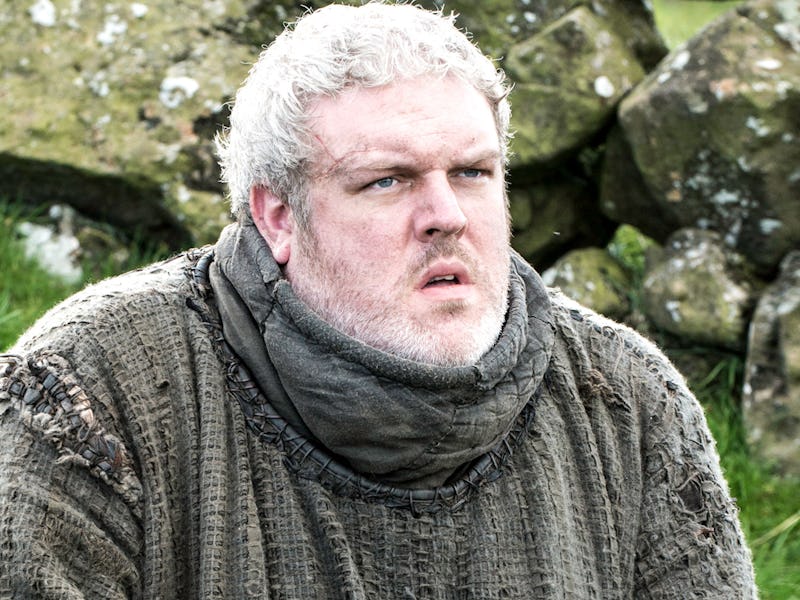In 'Game of Thrones' Season 6, Pace, Plot, and Expectations Are Its Biggest Problems
Hodor reminded us that the show's biggest problems may have been hiding in plain sight all along.

HBO’s Game of Thrones is arguably the only event show on television right now. Fans fiendishly tune in each week and take to social media to see and comment on the continuing quest for power in the Seven Kingdoms, the fictional land author George R.R. Martin created in his long-running source material. It’s become the thing to do with your Sunday night, partly because the show has evolved into a vivid, gorgeously violent soap opera fantasy world, and because you don’t want to suffer the embarrassment of not knowing what everybody is talking about during Monday morning water cooler chit-chat. But the pre-Season 6 book-reader fervor has given away to something new and unexpected, and the show seems to be struggling because of it.
Game of Thrones previously had the added bonus of book-readers fueling its ascent to TV notoriety. Martin’s equally notorious tomes changed points of view based on which character was the focus of each chapter. Likewise, the show revealed its sprawling plot by mirroring Martin’s methods.
Instead of being specifically subjective between characters like the book, the show simply jumped between focusing on individual characters or settings. In each episode of the show’s first five seasons, you got about 20 minutes in King’s Landing, another healthy chunk of the runtime at the Wall, 20 more minutes with whatever Daenerys was getting herself and her dragons into, and more.
As the show’s characters gradually split up to different far flung locales to play the strategic game of thrones their own way, the show’s editing was forced to strike a balance. Game of Thrones spent less and less time in one specific spot, to make sure characters got their on-screen due and to try and progress its narrative.
This was okay for the first five seasons, because the book-readers felt comfortable in their interpretations of the narrative. They essentially knew what was about to happen or what would eventually happen. Someone who read A Dance with Dragons in 2011 could pretty much figure out when Jon Snow would ostensibly die at the Wall at the hands of his Night’s Watchmen brothers in the show in 2014, and even hold it against the non book-readers who were only hooked to the show.
It didn’t matter that the show took its time with other relatively unfulfilling narrative threads of the other plot points while getting to huge events of upheaval like Jon’s death, Ned Stark’s execution, the infamous Red Wedding, or the Battle of the Blackwater. Jorah Mormont’s endless pining for Daenerys, Ramsay Bolton’s scene-chewing sadism, and Stannis Baratheon’s relentless brooding were necessary for moving the plot along. But that doesn’t mean they weren’t tedious plot points which sometimes made the show a repetitive slog. Hell, the showrunners even ditched Bran Stark’s storyline for an entire season so they could ostensibly catch up, but mostly because it was unbearably boring.
It was only the really crazy holy-shit moments that saved the show because they got people talking. These outrageous happenings kept the buzz going. Imagine Season 3 without the Red Wedding. What’d be the point?
Hats off to the creative forces behind the show, because god knows they pissed a whole lot of people off for doing outrageous things. Game of Thrones thrives on these outrageous developments which were gleaned from the books, and even events that didn’t specifically happen in the book that did happen in the show, like Hardhome, were enough to punctuate the lull. But now that Season 6 is largely original material whipped up by creators and showrunners David Benioff and D.B. Weiss and their collaborators, the cracks in the storytelling are beginning to show.
Last night’s episode The Door attempted a gasp-worthy mid-season moment by killing off the innocent character Hodor, Bran Stark’s fiercely loyal but mentally challenged babysitter since Season 1. It did what it was supposed to do and sent social media into an immediate firestorm, but this relatively inept decision to simply kill off the easiest character they could have killed off (minus Bran) did more to portray how the show is narratively lost. We’ll definitely have to wait and see how his death affects the rest of the characters, but the current non-book Game of Thrones season is at an impasse.
There needs to be some cohesion between these big important moments and the unexciting things that bring us to those moments. Otherwise it’s just a whole lot of teasing for one big, unearned payoff. Some people might like that in their Game of Thrones because it’s basically been like that since the beginning. But others want reasons for why killing off characters like Hodor is necessary.